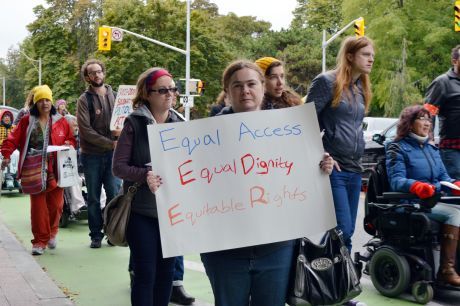Fight Ford!
You are here
The truth about Bill 148 and people with disabilities

October 24, 2018
On October 3rd 2018, Premier Ford spoke to provincial Parliament in defense of his decision to repeal Bill 148, the Fair Workplaces and Better Jobs Act. During his defense, Ford made the following statement:
“Speaker, I’ll never forget when I went to Renfrew—Minister of Transportation, John Yakabuski. I saw 20 people with disabilities come up to me and say, “Doug, I lost my job because of Bill 148.” These are young people and young adults with autism. Thousands across the province lost their jobs because of Bill 148. Students lost their jobs because of Bill 148. We’re going to create jobs. We’re going to make sure we hire students, hire people with special needs. We’re going to support the front-line workers of this province. We’ll make sure they thrive in this province.”
What Ford was referring to was the closure of sheltered workshops across Ontario. These workshops have been in gradual closure since 2015 as part of a process to modernize and individualize employment supports for disabled people.
Sheltered workshops in Ontario are typically run by not-for-profit organizations funded by the Ministry of Community and Social Services (MCSS). They provide work for people who struggle to find jobs, often adults who have developmental disabilities. Originally, they were created to be temporary places where people would learn job skills. In reality, many people have worked at them for decades, some for most of their lives.
Many of these organizations tried their best to match the sheltered workshop placement to the skill of the worker, but there are many incidences where this was not successful. Jobs include packaging, assembling products and clerical duties, like stuffing newspaper fliers. Sometimes people worked at fulfillment centers that had contracts with major Canadian companies.
Where Bill 148 comes in
Sheltered workshop workers were paid a stipend, sometimes only a few dollars an hour. Up until the passage of Bill 148, sheltered workshops were exempted from the Employment Standards Act. They did not have to pay the minimum wage, overtime, or provide hours of work protection.
Bill 148 did not directly close sheltered workshops, but it did remove their exemption from the ESA. There was no transition funding provided to sheltered workshops to allow them to meet the requirements of the ESA during the transition period. This forced a lot of sheltered workshops to close prematurely.
When the Liberals decided to slowly transition Ontario out of sheltered workshops, they hadn’t put new programs in place yet to replace them. This was really difficult for some people who worked there. For many, this was their social connection, and opportunity to feel like part of the workforce. This is also why some well-intentioned families are asking for the return of sheltered workshops.
By removing that exemption, the Liberals sparked a conversation about how workers with disabilities are perceived in Ontario, and why some people and politicians think they deserve less than other workers.
In the 2018 provincial election, there were a number of Conservative candidates who campaigned on bringing these sheltered workshops back. They capitalized on the gap in services, and directed the anger, inaccurately and conveniently, at Bill 148, much like Ford did a few weeks ago.
The Liberals did the right thing by closing sheltered workshops. Community Living Ontario passed a resolution thirty years ago that it would like to see an end to the workshops it helped create. It has taken that long to be heard. To re-open these workshops now would be a huge step backwards. There are ways to provide employment supports in community for equal pay, but that requires political will and adequate funding.
The Coming Attack on Social Assistance
Sheltered workshops are only part of the problem. For workers who are also on the Ontario Disability Support Program (ODSP) the current earnings exemption, which was recently increased by the Liberals, allows social assistance recipients to keep $200 of their gross wages per month. Every dollar over $200 reduces their income support by 50 percent of those wages. ODSP also provides $100 each month a person works or when their business makes a profit. This is called the Work-Related Benefit, because apparently the Liberals lack a sense of irony.
Ford and his government not only place less value on the labour of disabled people, they seem to think the current social assistance rate of $1,128 per month for individuals should suffice. In August, the Ford government cut the planned social assistance increase in half, pittance as it was. More sweeping changes are expected to be announced by November 8th. Please watch for coming protests in your area.
Without alternatives in place, the options for many disabled people are underpaid work or no work at all, but there are better options. Disabled people deserve equal payment for equal work, and no worker should be devalued on the basis of disability. We need strong allies among non-disabled workers and across all disability communities to make this happen. Please join the fight against Ford’s and his manipulative use of disabled people for his own propaganda. Join the Fight for $15 and Fairness today!
• Join the Emergency Action: Hands of $15 and Fairness! Wednesday October 24, at 5 pm, 400 University Avenue, Toronto
Section:









